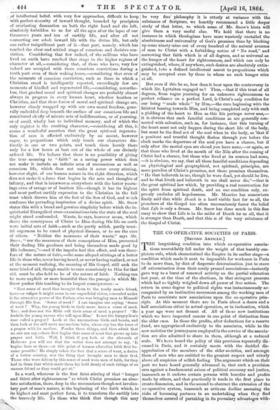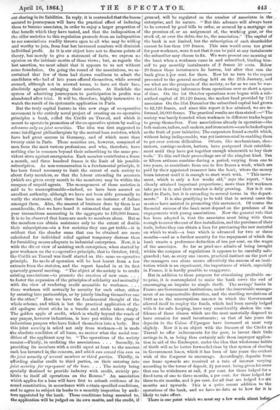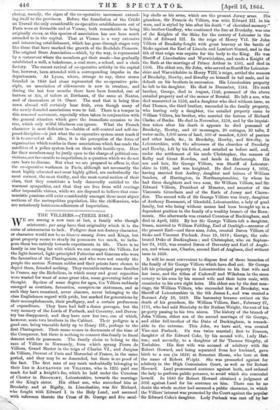THE languishing condition into which co-operative associa- tions unavoidably fell
ander the weight of that harshly sus- picious rule, which characterized the Empire in its earlier stage—a condition which made it next to impossible for workmen in Paris to do more than, by dint of desperate determination, just to stave off extermination from their sorely pressed associations—instantly gave way to a burst of renewed activity on the partial relaxation last year, at the time of the elections, in that stringent pressure which had so tightly weighed down all power of free action. The return in some degree to political rights was instantaneously ac- companied by an instinctive movement among the working men of Paris to constitute new associations upon the co-operative prin- ciple. At this moment there are in Paris about a dozen and a half associations either in actual operation, or in inchoation, which a year ago were not dreamt of. All of these new institutions which we have inspected concur in one point of distinction from the older ones. In those the profits, after deductions for a reserve fund, are appropriated exclusively to the associates, while in the new societies the journeymen employed in the service of the associa- tion are also admitted to share in them, although at a reduced scale. We have heard the policy of this provision repeatedly dis- cussed in Paris, and it certainly meets with the decided dis- approbation of the members of the older societies, and amongst them of men who are entitled to the greatdst respect and utterly above all suspicion of selfish feeling. The argument which on their part we have heard generally advanced is, that such a provision errs against a fundamental axiom of political economy and justice, inasmuch as it endows certain persons with benefits and profits made by others, and that practically it tends in the first place to create dissension, and in the second to obstruct the extension of the co-operative system, inasmuch as artizans decline assuming the risks of becoming partners in an undertaking when they find themselves assured of partaking in its pecuniary advantages with-
out sharing in its liabilities. In reply, it is contended that the bonus secured to journeymen will have the practical effect of inducing them to become associates, in order to enjoy a larger proportion of that benefit which they have tasted, and that the indisposition of the older societies to this regulation proceeds from an indisposition to see associations readily thrown open to all who may be willing and worthy to join, from fear lest increased numbers will diminish individual profit. As it is our object here not to discuss points of theory, but merely to give a statement of facts, we express no opinion on the intrinsic merits of these views ; but, as regards the last assertion, we must admit that it appears to us not without some foundation. On going the round of the associations, we as- certained that few of them had shown readiness to admit the candidates who had of late years offered themselves, while several seemed, although not in avowed terms, to have set their face, absolutely against enlarging their numbers. At Rochdale the system of admitting journeymen to participation in profits was abandoned after trial. It will be, therefore, highly instructive to watch the result of its systematic application in Paris.
But the truly capital feature in this new stage of co-operative movement is the entirely novel project of creating on co-operative principles a bank, called the Credit au Travail, and which is meant to operate in promotion of the co-operative system by making advances only on joint securities. The idea was first suggested to .801113 intelligent philanthropists by the mutual loan societies, which have had great success in Germany, and of which more than twenty exist in Paris. These societies are, however, composed of men from the most various professions, and who, therefore, have nothing else in common beyond their subscribing to the same pro- vident store against emergencies. Each member contributes a franc a month, and three hundred francs is the limit of his possible subscription. As non-remuneration is a fundamental principle, it has been found necessary to limit the extent of each society to about forty members, so that the labour attending its accounts (which are given every month to the members) may be within the compass of unpaid agents. The management of these societies is said to be unexceptionable—indeed, we have been assured on excellent authority, although we have not been able personally to verify the statement, that there has been no instance of failure amongst them. Also, the amount of business done by them is so considerable, that we have heard it estimated that some did last year transactions amounting in the aggregate to 120,000 francs. It is to be observed that loans are made to members alone. But as the members can obtain assistance only to the extent of double their subscriptions—in a few societies they can get treble—it is evident that the slender sums that can be obtained are more calculated for individual relief against temporary distress than for furnishing means adequate to industrial enterprises. Now, it is with the direct view of assisting such enterprises, when started by poor workmen on the co-operative principle, that in October, 1803, the Credit au Travail was itself started on this same co-operative principle. Its mode of operation will be best learnt from a few extracts from the statutes, and the report handed in at its first quarterly general meeting. " The object of the society is to credit existing associations—to promote the creation of new ones. . . . 'to foster the expansion of the principles of solidarity and mutuality with the view of rendering credit accessible to workmen.. . these workmen will mutually be security for each other, either by entering into partnerships, or by jointly binding themselves one for the other." Here we have the fundamental thought of the whole scheme, and which is but the practical application of the old apologue about sticks in a bundle and sticks taken singly. The golden apple of credit, which is wholly beyond the reach of any pauper, however industrious, is here put within the grasp of industrious paupers who have linked themselves into a body. But this joint security is asked not only from workmen—it is made the absolute condition of all loans, no matter what the social con- dition of the applicant may be. " The operations of the society consist—Firstly, in crediting the associations.. . . Secondly, in providing its members with a credit equal at least to the amount each has invested in the concern, and which can exceed this sum on the joint security of several members or third parties. Thirdly, in affording similar credit to third parties, on their entering into joint security for repayment of the loan. . . . The society being specially destined to provide industry with credit, strictly pro- hibits to itself all operations on the Bourse." An association which applies for a loan will have first to submit evidence of its sound constitution, in accordance with certain specified conditions, and to agree to subject its books to a monthly inspection by andi- tom appointed by the bank. These conditions being assented to, the-application will be judged on its own merits, and the credit, if
granted, will be regulated on the number of associates in the , . enterprise, and its nature. " But this advance will always have to be covered by good bills to order, or secured by a mortgage on the premises of, or an assignment of, the working gear, or the stock of, or over the debts due to, the association." The capital of the bank is not limited, but the subscription of each shareholder cannot be less than 100 francs. This sum would seem too great for poor workmen, were it not that it can be paid at any instalments the subscriber may choose to fix. We were present one morning at the bank when a workman came in and subscribed, binding him- self to pay monthly instalments of 2 francs 50 cents. Below 20 francs these investments lie barren, but after that sum the bank gives 5 per cent. for them. Now let us turn to the report presented to the general meeting held on the 27th January, and see what are the prospects of the society, so far as we can be war- ranted in drawing inferences from operations over so short a space of time. On the 1st October operations were begun with a sub- scribed capital of 20,120 francs, the modest fund provided by 172 associates On the 31st December the subscribed capital had grown to 42,120 francs, and since this report it has attained, we are in- formed, 56,000 francs. The practical results are thus stated :—" The society was barely founded when workmen in different trades began to group themselves. Four associations already in operation—the bolt-makers, tailors, nail-makers, and ironc asters --can be looked upon as the fruit of your initiative: The carpenters found a credit which, without being indispensable, was yet instrumental in enabling them to get over serious difficulties. Others, like mechanicians, shoe- makers, carriage-makers, hatters, have postponed their establish- ment until they have got together enough wherewith to buy their tools." To this end their proceedings are of the simplest kind. Ten or fifteen artisans combine during a period, varying from one to two years, to contribute from one to five francs a week, which are paid by their appointed treasurer into the bank, where the money bears interest until it is enough to start work with. ." This move- ment, which is only a few weeks old," says the report, " has already attained important proportions ; more than 200 workmen take part in it, and their number is daily growing. Nor is it con- fined to Paris, but it is extending to several towns in the depart- ments." It is also gratifying to be told that in several cases the masters have assisted in promoting this movement. Of course the financial success of the bank must depend on the prudence of its engagements with young associations. Now the general rule that has been adopted is, that the associates must bring with them enough to cover the cost of first installation, and the purchase of their tools, before they can obtain a loan for purchasing the raw material on which to work—a loan which is advanced for two or three months—and as a further security for the repayment of which the bank exacts a preference deduction of ten per cent. on the wages of the associates. So far as prudence admits of being brought within the compass of regulations it appears to be carefully safe- guarded ; but, as every one knows, practical instinct on the part of the managers can alone secure effectively the success of an insti- tution which is an experiment, the importance of which, especially in France, it is hardly possible to exaggerate.
But in addition to these purposes for stimulating profitable en- terprise, it is contemplated to make the bank serve the end of encouraging an impulse to simple thrift. The savings' banks in France are Government institutions, under the inscrutable manage- ment of an impenetrable direction, and the startling revelations of 1848 as to the unscrupulous manner in which the Government allowed itself to employ the funds, which had been merely lodged with it for safe keeping, have very considerably shaken the con- fidence of those classes which are the most materially disposed to have occasion for small investments ; so that of late years the deposits in the Caisse d'Epargne have increased at most very slightly. Now it is an object with the framers of the Credit au Travail to offer inducements for the poor, to invest their little savings in it, as being thus certainly safe from improper applica- tion in aid of the Exchequer, under the idea that wholesome habits of thrift will so be better forwarded than by that system of sharing in Government loans, which it has been of late years the evident wish of the Emperor to encourage. Accordingly, deposits from one franc upwards are received at a rate of interest varying according to the terms of deposit, 2i per cent. being given for sums that can be withdrawn at call, 3 per cent. for those lodged for a fixed term of one to three months, 4 per cent. for those lodged.for three to six months, and 5 per cent. for all that are lodged for six months and upwards. This is a quite recent addition to the
i
operations of the bank, and we have no data as to how far it is
likely to take effect.
There is one point which we mast say a few words about bef2:-/".° closing, namely, the signs of the co-operative movement extend- ing itself to the provinces. Before the foundation of the Credit an Travail the.only considerable co-operative establishments out of Paris were at Grenoble and at Vienne, both remarkable as being originally stores, as this species of association has not been much attended to in the capital. That at Vienne is a very extensive and interesting establishment, which has gone through stages very like those that have marked the growth of the Rochdale Pioneers. The original Store Association—which, by the way, is represented by a restaurant where the members get their meals—has gradually established a mill, a bakehouse, a coal store, a school, and a cloth factory. The recent revival of co-operative activity in the capital has, however, been attended with a corresponding impulse in the departments. At Lyons, where, strange to say, three stores founded in 1848 had alone represented the co-operative prin- ciple, an association of silkweavers is now in creation, and during the last four months there have been founded, one of hatters at Aix, of tailors at Bordeaux, of the same at Nantes, and of shoemakers at St. Omer. The seed that is being thus sown abroad will certainly bear fruit, even though many of the newly-founded associations were to fail. There is a temper in this renewed movement, especially when taken in conjunction with the general situation which gave the immediate occasion to its rise, which only wilful blindness can ignore. What the French character is most deficient in—habits of self-control and self-im- posed discipline—is just what the co-operative system must teach if it is to succeed at all. Also, it is the perception of the force of organization which resides in these associations which has made the satellites of a police system look on them with hostile eyes. How far their members may be justly open to the charge of political con- victions, not favourable to imperialism, is a question which we do not care here to discuss. But what we are prepared to affirm is, that the co-operative workmen in Paris, although not necessarily the most highly educated and most highly gifted, are undoubtedly the most earnest, the most thrifty, and the most moral section of their class, that they constitute a body deservedly entitled to the warmest sympathies, and that they are free from wild cravings after impossible visions, while we are disposed to believe that com- munistic passions still exist considerably amongst those most abject sections of the metropolitan population, like the chiffonniers, who are notoriously boisterous adherents of Imperialism.
































 Previous page
Previous page